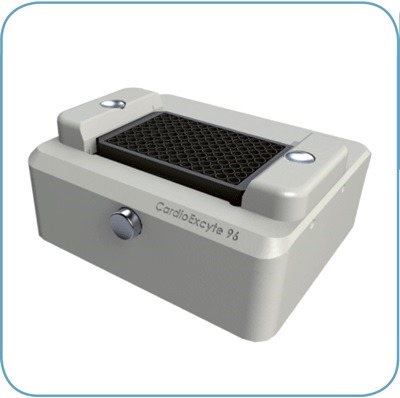Cardiac safety assessment is a vital part of drug development since late withdrawals of compound candidates, due to heart liability issues such as ventricular arrhythmia, are very costly. In-vivo methods give highly relevant information but are extremely low throughput allowing the analysis of only a handful of compounds. In-vitro methods, such as automated patch clamp and other methods, offers higher throughput, however from one type of cardiac ion channels, typically over-expressed in cell lines. Nanion's new device, the CardioExcyte 96, has the potential to bridge this gap, by allowing reliable label-free measurements of short- and long-term compound effects on the beating pattern of stem cell-derived cardiomyocytes. The system offers the highest impedance time-resolution (sub-millisecond) on the market and records from 96 wells in parallel. Efficiency and ease-of-use are facilitated by an outstanding software package for data handling and export; thus an essential part of the CardioExcyte system.

Dr. Sonja Stölzle-Feix, Senior Scientist, Nanion Technologies, Munich, says:
"CardioExcyte 96 is an easy-to-use system, providing impedance-based cardiac safety data from a diversity of stem cell-derived cardiomyocytes. Concentration- and time-dependence of a compound's potential cardiotoxicity can efficiently be obtained. Further on, the powerful software, used for recordings and analysis, employs comprehensive beat investigation algorithms, displaying detailed beating kinetics in real-time. Data handling and export is straightforward, easy to grasp and yet very, very powerful."
Dr. Niels Fertig, CEO of Nanion, continues:
"CardioExcyte is a new branch in Nanion's product portfolio. This label-free impedance system constitutes an excellent complement to automated patch clamp-based safety screening. It offers cost-efficient and highly relevant data on a drug candidate's effect on intact networks of beating heart cells. Alteration of beating patterns can give a hint on what cardiac ion channel is affected, which is where detailed electrophysiology investigations take on the further investigations. Cardiac network responses offer a comprehensive view of a compound's safety profile, without having to use in-vivo methods, and thus save time, costs and suffering."
The CardioExcyte 96 is an automated device, recording from 96 wells at a time. With embedded electronics and a sophisticated sensor technology inside the well-plate based consumables, CardioExcyte 96 is a turn-key system for efficient impedance measurements, also allowing recordings residing inside of the incubator. The system has been validated with stem cell derived cardiomyocytes from several providers (Axiogenesis, Cellular Dynamics International, GE Healthcare), as well as beating, 3D-clusters (Cellectis).
Source: http://www.nanion.de/